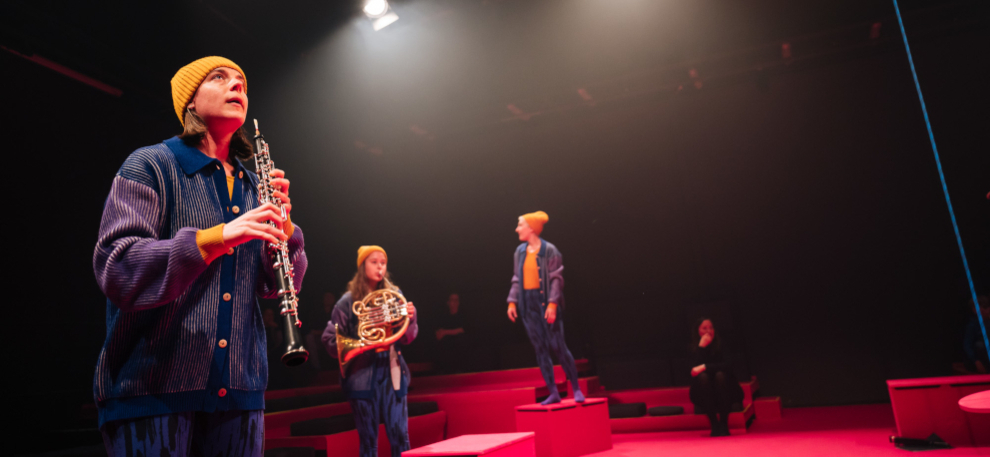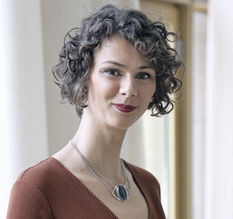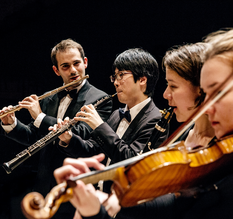


Peter und der Wolf

Gesang
Lisa Florentine Schmalz
Soprano
Birthplace:
Kiel, Germany
Studies:
Master Opera, Hamburg University of Music and Theatre
Bachelor of Voice, Hamburg University of Music and Theatre and Zurich
University of the Arts
Prizes
Scholarship recipient of the Claussen Simon Foundation and the German National Academic Foundation
Elise - Meyer Competition
Master classes:
Reri Grist, Brigitte Fassbaender, Michelle Breedt and Christiane Iven
Stages:
Junge deutsch Oper Berlin, Theater Kiel, Thalia Theater, Theater Bremen,
Kampnagel, et al.
Collaborations with directors:
Kerstin Steeb, Benjamin van Bebber, Martin Mutschler, Vendula Nováková, Maurice
Lenhard, et al.
photo: Vera Drebusch

Gesang
Claire Gascoin
Mezzosoprano
Birthplace:
France
Studies:
Bachelor’s degree at the Musikhochschule Leipzig, Master’s degree at the University of Music and Performing Arts Vienna,
Prizes:
Kammeroper Rheinsberg (2015), Brahms competition (2014) Clara-
Schumann competition (2014), owner of a scholarship of the Studienstiftung des deutschen Volkes
Master classes:
Claudia Visca, Krassimira Stoyanova
Relation to the Hamburg State Opera:
Member of the International Opera Studio of the Hamburg State Opera since the 2022/2023 season
Important parts:
Ottone (L’incoronazione di Poppea), Carmen (Carmen), Testo (Il Combattimento di Tancredi e Clorinda), Aschenputtel (Cenerentola), Annina (Romilda e Costanza), et al.
Stages:
Staatstheater Cottbus, Oper Krakau, Opéra de Lyon, Royal Opera House Muscat, Opera de Tenerife, et al.
Cooperations with directors:
Michael Sturminger, et al.
Cooperations with conductors:
Stéphane Fuget, Antonino Fogliani, et al.
photo: Jörn Kipping

Querflöte
Akademist*innen des Philharmonischen Staatsorchesters
In 2011 the Philharmonic State Orchestra was the first to found an academy for nurturing new talents. 14 young musicians are given the chance to work in close cooperation with the orchestra for the duration of two years. The main aspect of this training is to participate in rehearsals, concerts, operas and ballets, to get to know specific challenges and to enjoy playing in an orchestra. The academy education program is both challenging and extensive, demanding concentration and commitment from its participants. The members of the Orchestra Academy learn an extensive variety of symphonic works, ballets and operas as well as getting to know the flexibility of a business with a large repertoire. The two year academic program includes weekly private lessons, as well as help in preparing for auditions, offered by musicians of the orchestra. Apart from this, the young musicians can gain experience in chamber music by rehearsing and performing chamber music concerts.
The educational project made possible thanks to the support of sponsors like the Hapag-Lloyd Stiftung, the Kulturbehörde der Freien und Hansestadt Hamburg and the Philharmonische Gesellschaft. To the Philharmonic State Orchestra, the Orchestra Academy is a valuable addition to its work in supporting young talents.
photo: Foto: Felix Broede

Oboe
Akademist*innen des Philharmonischen Staatsorchesters
In 2011 the Philharmonic State Orchestra was the first to found an academy for nurturing new talents. 14 young musicians are given the chance to work in close cooperation with the orchestra for the duration of two years. The main aspect of this training is to participate in rehearsals, concerts, operas and ballets, to get to know specific challenges and to enjoy playing in an orchestra. The academy education program is both challenging and extensive, demanding concentration and commitment from its participants. The members of the Orchestra Academy learn an extensive variety of symphonic works, ballets and operas as well as getting to know the flexibility of a business with a large repertoire. The two year academic program includes weekly private lessons, as well as help in preparing for auditions, offered by musicians of the orchestra. Apart from this, the young musicians can gain experience in chamber music by rehearsing and performing chamber music concerts.
The educational project made possible thanks to the support of sponsors like the Hapag-Lloyd Stiftung, the Kulturbehörde der Freien und Hansestadt Hamburg and the Philharmonische Gesellschaft. To the Philharmonic State Orchestra, the Orchestra Academy is a valuable addition to its work in supporting young talents.
photo: Foto: Felix Broede

Klarinette
Akademist*innen des Philharmonischen Staatsorchesters
In 2011 the Philharmonic State Orchestra was the first to found an academy for nurturing new talents. 14 young musicians are given the chance to work in close cooperation with the orchestra for the duration of two years. The main aspect of this training is to participate in rehearsals, concerts, operas and ballets, to get to know specific challenges and to enjoy playing in an orchestra. The academy education program is both challenging and extensive, demanding concentration and commitment from its participants. The members of the Orchestra Academy learn an extensive variety of symphonic works, ballets and operas as well as getting to know the flexibility of a business with a large repertoire. The two year academic program includes weekly private lessons, as well as help in preparing for auditions, offered by musicians of the orchestra. Apart from this, the young musicians can gain experience in chamber music by rehearsing and performing chamber music concerts.
The educational project made possible thanks to the support of sponsors like the Hapag-Lloyd Stiftung, the Kulturbehörde der Freien und Hansestadt Hamburg and the Philharmonische Gesellschaft. To the Philharmonic State Orchestra, the Orchestra Academy is a valuable addition to its work in supporting young talents.
photo: Foto: Felix Broede

Fagott
Akademist*innen des Philharmonischen Staatsorchesters
In 2011 the Philharmonic State Orchestra was the first to found an academy for nurturing new talents. 14 young musicians are given the chance to work in close cooperation with the orchestra for the duration of two years. The main aspect of this training is to participate in rehearsals, concerts, operas and ballets, to get to know specific challenges and to enjoy playing in an orchestra. The academy education program is both challenging and extensive, demanding concentration and commitment from its participants. The members of the Orchestra Academy learn an extensive variety of symphonic works, ballets and operas as well as getting to know the flexibility of a business with a large repertoire. The two year academic program includes weekly private lessons, as well as help in preparing for auditions, offered by musicians of the orchestra. Apart from this, the young musicians can gain experience in chamber music by rehearsing and performing chamber music concerts.
The educational project made possible thanks to the support of sponsors like the Hapag-Lloyd Stiftung, the Kulturbehörde der Freien und Hansestadt Hamburg and the Philharmonische Gesellschaft. To the Philharmonic State Orchestra, the Orchestra Academy is a valuable addition to its work in supporting young talents.
photo: Foto: Felix Broede

Horn
Akademist*innen des Philharmonischen Staatsorchesters
In 2011 the Philharmonic State Orchestra was the first to found an academy for nurturing new talents. 14 young musicians are given the chance to work in close cooperation with the orchestra for the duration of two years. The main aspect of this training is to participate in rehearsals, concerts, operas and ballets, to get to know specific challenges and to enjoy playing in an orchestra. The academy education program is both challenging and extensive, demanding concentration and commitment from its participants. The members of the Orchestra Academy learn an extensive variety of symphonic works, ballets and operas as well as getting to know the flexibility of a business with a large repertoire. The two year academic program includes weekly private lessons, as well as help in preparing for auditions, offered by musicians of the orchestra. Apart from this, the young musicians can gain experience in chamber music by rehearsing and performing chamber music concerts.
The educational project made possible thanks to the support of sponsors like the Hapag-Lloyd Stiftung, the Kulturbehörde der Freien und Hansestadt Hamburg and the Philharmonische Gesellschaft. To the Philharmonic State Orchestra, the Orchestra Academy is a valuable addition to its work in supporting young talents.
photo: Foto: Felix Broede
